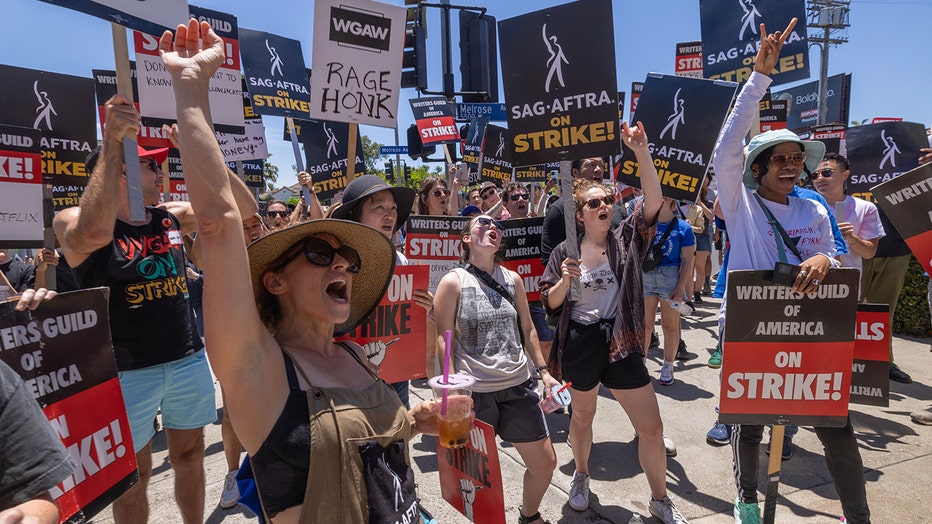Video game actors go on strike: Here’s why

AI impact on nationwide strikes
LiveNOW's Julianne Amaya caught up with George Mason University Law Professor & Attorney, Carl Szabo, on the ongoing strikes. Artificial Intelligence seems to be the wild card in many of the strikes we've seen across the nation. Carl shares his perspective on the matter.
LOS ANGELES - Hollywood’s video game actors went on strike Friday following more than a year and half of negotiations with game industry giants that were halted over artificial intelligence protections.
According to the Screen Actors Guild-American Federation of Television and Radio Artists (SAG-AFTRA) National Board and with the "unanimous advice and counsel" of the Interactive Media Agreement Negotiating Committee, the strike was called effective on July 26 at 12:01 a.m.
The union said it had been negotiating with an industry bargaining group consisting of video game companies, including divisions of Activision and Electronic Arts. Those companies are Activision Productions Inc., Blindlight LLC, Disney Character Voices Inc., Electronic Arts Productions Inc., Formosa Interactive LLC, Insomniac Games Inc., Llama Productions LLC, Take 2 Productions Inc., VoiceWorks Productions Inc. and WB Games Inc.
Negotiations began in October 2022 and on Sept. 24, 2023, SAG-AFTRA members approved a video game strike authorization with a 98.32% yes vote.

"Eighteen months of negotiations have shown us that our employers are not interested in fair, reasonable A.I. protections, but rather flagrant exploitation," Interactive Media Agreement Negotiating Committee Chair Sarah Elmaleh said in a statement.
Why did video game actors go on strike?
Leaders of SAG-AFTRA have billed the issues behind the labor dispute — and AI in particular — as an existential crisis for performers. Game voice actors and motion capture artists' likenesses, they say, could be replicated by AI and used without their consent and without fair compensation.
RELATED: Hollywood actors' strike ends with union, studios reaching tentative agreement
The union said the unregulated use of AI also poses "an equal or even greater threat" to performers in the video game industry than it does in film and television because the capacity to cheaply and easily create convincing digital replicas of performers' voices is widely available.
SAG-AFTRA said that despite agreements being reached on many issues important to members, the companies refuse to affirm, in clear and enforceable language, that they will protect all performers covered by this contract in their A.I. language.

Writers Guild of America votes to go on strike
The Writers Guild of America has voted to go on strike. Dr. James Ivory, a professor at Virginia Tech's School of Communication on joined LiveNOW from FOX's Josh Breslow to discuss the impacts of the strike.
"We’re not going to consent to a contract that allows companies to abuse A.I. to the detriment of our members. Enough is enough. When these companies get serious about offering an agreement our members can live — and work — with, we will be here, ready to negotiate," SAG-AFTRA President Fran Drescher said in a statement.
The union said that any game looking to employ SAG-AFTRA talent to perform covered work must sign on to two new agreements, which the union said offers "critical A.I. protections for members."
"The video game industry generates billions of dollars in profit annually. The driving force behind that success is the creative people who design and create those games. That includes the SAG-AFTRA members who bring memorable and beloved game characters to life, and they deserve and demand the same fundamental protections as performers in film, television, streaming, and music: fair compensation and the right of informed consent for the A.I. use of their faces, voices, and bodies," Duncan Crabtree-Ireland, the union’s chief negotiator said.
What are video game performers asking for?
SAG-AFTRA has said that some of the key issues include securing wages that keep up with inflation, protections around "exploitative uses" of artificial intelligence and safety precautions that account for the strain of physical performances as well as vocal stress.
Union negotiators also told The Associated Press that they had made gains in bargaining over wages and job safety, but that the game studios refused to "provide an equal level of protection from the dangers of AI for all our members."

Expert explains future of Artificial Intelligence
Vice President Kamala Harris spoke Wednesday at an Artificial Intelligence conference in London, addressing the Biden administration's plans to address concerns over A.I. Simon Wilby, the creator of 1Voice A.I. joined LiveNOW from FOX's Mike Pache to discuss the concerns and potential solutions.
"If we had seen sufficient protection for all performers who work this contract ... then we would not be here today," Interactive Media Agreement Negotiating Committee Chair Sarah Elmaleh said in an interview Thursday afternoon.
The union says performers are worried that unchecked use of AI could provide game makers with a means to displace them — by training an AI to replicate an actor’s voice or to create a digital replica of their likeness without consent.
Some also argue that AI could also strip less experienced actors of the chance to land smaller background roles, such as non-player characters, where they typically cut their teeth before landing larger roles. The unchecked use of AI, performers say, could also lead to ethical issues if their voices or likenesses are used create content that they do not morally agree with.
Second time video game actors go on strike
This marks the second time SAG-AFTRA's video game performers have gone on strike.
Their first work stoppage, in October 2016, began after more than one year of negotiations failed.
The union and video game companies reached a tentative deal 11 months later, in September 2017. At the time, the strike — which helped secure a bonus compensation structure for voice actors and performance capture artists — was the longest in the union's history, following the merger of Hollywood’s two largest actors unions in 2012.
This story was reported from Los Angeles. The Associated Press contributed.

